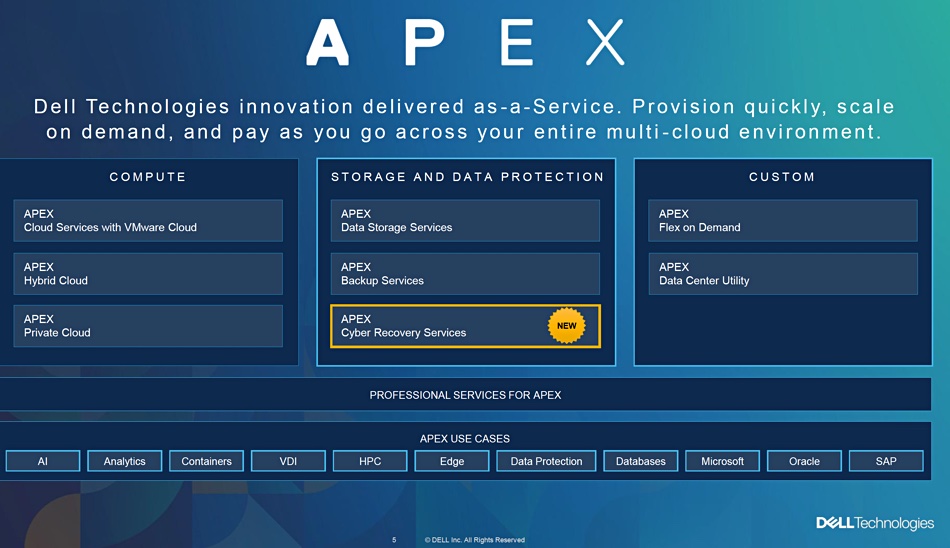Day one of Dell Technologies World in Las Vegas saw Dell bring customers more APEX on-premises and public cloud cyber resilience services, a deal integrating its on-premises object storage with Snowflake, and progress in porting its block, file and object storage software to the public cloud.
The race is on to deliver consistent services across the complexity of the three main public and on-premises clouds with data portability and ramped up capabilities to fence off ransomware and recover from attacks. Dell has to do this to retain its customers and gain converts from HPE, IBM, NetApp, Pure Storage and other vendors’ accounts.

Chuck Whitten, Dell Technologies co-COO, provided an announcement statement: “Our customers want help reducing complexity and are seeking solutions that use a common approach to managing data wherever it lives – from public clouds, to the datacenter, to the edge. We are building a portfolio of software and services that simplifies on-premises and multi-cloud environments and offers.”
Dell announced a further APEX on-premises full stack system delivered and paid for as a service: APEX Cyber Recovery Services, in which selected on-premises data goes into an automated isolated vault with dynamic anomaly detection and Dell-assisted recovery. Using standardized configurations the company looks after day-to-day cyber recovery vault operations.

There are two cyber recovery offerings for the public cloud. The first is PowerProtect Cyber Recovery in Azure, with which customers can deploy a separated cyber vault in Azure to protect and isolate on-premises or in-Azure data away from a ransomware attack. If an attack happens the secured data can be recovered to the datacenter, a new Azure facility, or to an existing but unaffected Azure set up.
The second is in AWS, and goes further as its long name suggests: CyberSense for Dell PowerProtect Cyber Recovery for AWS. CyberSense is a product supplied to Dell by Index Engines – a not yet well known company that catalogues unstructured data to create searchable indexes. Its CyberSense offering uses them for ransomware detection.
The Dell CyberSense product features:
- Cyber recovery vault in AWS for data from on-premises datacenter or in-cloud;
- Automated operational air gap;
- Comprehensive indexing;
- Full content analytics to validate data integrity;
- Machine learning and forensic tools to detect, diagnose and speed data recovery;
- Corruption detection with post-attack forensics to identify last good copy.
The intent is to monitor files and databases to find out if a cyberattack has occurred and identify the most recent uncorrupted copy of data for recovery.
We envisage this facility being extended to Azure and then GCP in due course.
Snowflake and and Project Alpine
Dell and Snowflake have worked out a deal to bring Snowflake’s wildly popular cloud data warehouse analytics to data held in Dell’s object storage systems. This is a first – no equivalent integration exists between Snowflake and any other storage vendor. The two companies will develop a facility to use Snowflake for in-place analytics against on-premises data and also the ability to copy on-premises object data to Snowflake in AWS, Azure and Google’s cloud.
Bringing Snowflake to on-premises data will minimize data retrieval costs, egress charges and fees for Dell object storage customers. It can also meet compliance and data residency requirements if they apply.
A preview of this will be shown at Dell’s Las Vegas event, with a run of Snowflake analytics against external tables representing on-premises data lakes.
Previously Dell has talked about Project Alpine, its initiative to port its block, file and object storage software to the public cloud. The intention is to combine its storage services with native public cloud services and provide a consistent public cloud-to-on-premises experience with PowerStore (file and block), PowerFlex (HCI block), PowerScale and/or ObjectScale (file and object).
Dell says one example use could be in the AWS block environment with replication of containers to AWS. This would enable developers to write cloud-native container code once and run it anywhere. A second example could be using Azure compute to train a machine learning model with Dell file services in Azure.
We hear that, maybe, Pure Storage and Snowflake will be announcing a similar deal shortly.
Competition
All of Dell’s mainstream competitors are focusing on public cloud-style IT service consumption, easing customers’ ability to operate in a hybrid multi-cloud environment, and countering ransomware. HPE aims to bring its customers a cloud-like full stack experience with its GreenLake portfolio and things like CloudVolumes to move data between the on-premises private cloud and public clouds. It has no equivalent of CyberSense and moving the hardware-assisted Primera array software to the public cloud has not been announced.
Pure Storage has its Pure-as-a-Service and Cloud Block Store plus a focus on ransomware attack protection.
NetApp has ported its environment to the AWS, Azure and Google public clouds, with Cloud Volumes for example, and has its distinctively different Cloud Ops business. It has a focus on ransomware but it doesn’t have the equivalent of Dell’s PowerProtect business.
None of the three have the equivalent functionality of Dell’s CyberSense-based offering.
Each of these four vendors – Dell. HPE, NetApp and Pure Storage – would say they are at the forefront of efforts to cloudily and secure their offerings for a consistent experience experience in the hybrid multi-cloud world. Their portfolios of products and services are so complex that detailed analysis is needed to thoroughly compare and contrast them – beyond the scope of this article.
Availability
Project Alpine is a work in progress. The Snowflake-Dell deal will see the two work on product integrations and joint go-to-market efforts in the second half of 2022. Dell APEX Cyber Recovery Services is available today in the United States with broader availability planned for later this year. Dell PowerProtect Cyber Recovery for Microsoft Azure and CyberSense for Dell PowerProtect Cyber Recovery for AWS will both be globally available in the second half of this year.








